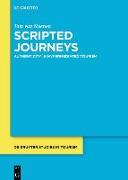Scripted Journeys
BücherAngebote / Angebote:
Throughout recorded history, until a relatively short time ago, the idea of travel was associated with the adventure of entering unfamiliar or unknown territory, leading to new experiences that could be both amazing and frightening. Today, however, travel takes place in a world that is comprehensively known and mapped. Over a few decades, the expanding middle classes of the Global North have achieved greatly increased access to air and sea travel around the world. The ubiquity of computation in daily life has had a further decisive influence on the imaginative aspects of travel. Online distributed knowledge of the world is now readily available through services such as Google Maps, adventurous travel bloggers and reporters, or users on travel review platforms. From booking and 'reading up, ' to writing down and reminiscing: all stages of one's trip can be guided and augmented by increasingly connective, personalized, and optimized computational systems. It is this late modern infrastructure of tourism, increasingly efficient, calculable, and affordable, that is a cause of concern for the middle classes. In the face of informational abundance, digitally aided tourism is fixated on the access to authenticity. Lodging rental platform Airbnb advertises with the slogan "Don't just go there, live there". Professional bloggers and vloggers instruct their audience not just on where, but on how to travel. Review website such as TripAdvisor aggregate millions of personal reviews to offer 'objective', data-driven authentication of places around the globe. And virtual experiences take players to places they could not dream of reaching themselves. The desire for authenticity and self-realization, however, often comes at the expense of ecological and social awareness. As 'tourists' become 'travelers', the world transforms into territory for leisure and materiality for their conspicuous consumption. Based on a comparative digital ethnography of 'platform tourism', which includes media such as blogs and vlogs, review websites, and video game environments, Scripted Journeys presents a critical analysis of digitally aided touristic practice and presentation, in which control and compliance are in constant tension. Conceptually, the book innovatively supplements anthropological work in tourism studies with theoretical and analytical perspectives from new media studies. Methodologically, it offers new pathways for examining online spaces and ways of interacting. Empirically, it discusses a wide range of phenomena-from rigid self-curation practices to gain clicks, to quantifiable evaluations of behavior, to navigation mechanics in digital games. In doing so, Scripted Journeys reveals the many ways in which people express themselves and their trips amidst the tightly circumscribed affordances of the digital.
Erscheint im September




